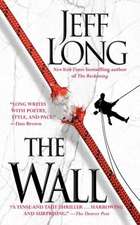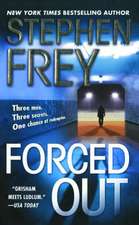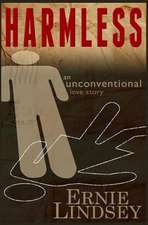The Darkest Joy
Autor Marata Erosen Limba Engleză Paperback – 27 feb 2014
Deep-sea fisherman, Chance Taylor, has just wrapped his guitar set at the local saloon when he sees the silhouette of a young woman, the full moon highlighting her shadow as she plummets from a pier too high for diving...into water too cold to survive. Without thinking, he plunges in after her, saving Brooke from drowning.
As Chance works to save her from her own emotional fragility, Brooke finally begins to learn how to save herself. But when their chemistry begins to consume them, Brooke withdraws. She's determined to be the master of her own destiny...until the past catches up with her in a cataclysmic plan so dark, so final-it threatens their love-and their lives.
Preț: 116.01 lei
Nou
Puncte Express: 174
Preț estimativ în valută:
22.20€ • 23.24$ • 18.37£
22.20€ • 23.24$ • 18.37£
Carte disponibilă
Livrare economică 15-29 martie
Preluare comenzi: 021 569.72.76
Specificații
ISBN-13: 9781476752211
ISBN-10: 1476752214
Pagini: 320
Dimensiuni: 140 x 210 x 33 mm
Greutate: 0.33 kg
Editura: Gallery Books
Colecția Gallery Books
ISBN-10: 1476752214
Pagini: 320
Dimensiuni: 140 x 210 x 33 mm
Greutate: 0.33 kg
Editura: Gallery Books
Colecția Gallery Books
Notă biografică
Marata Eros is the New York Times and USA TODAY bestselling author of dark, romantic new adult novels, including A Terrible Love and its companion novel A Brutal Tenderness. A passionate writer who loves interacting with her readers, Marata lives in South Dakota with her husband.
Extras
The Darkest Joy
![]()
I cover my nose then cough. A plume of dust rises and I drop my hand.
What a dump.
I hear a horn beep and turn around. The taxi driver who gave me the ride from ERA, the local air carrier, waves.
I give him the thumbs-up and he drives off. My eyes shift back to the run-down log cabin. I keep my eyes on the wide plank door as I climb the thick steps, the deep graining and knots in the wood, loved by age, mellowed to amber, greet me. I look down at the key in my hand, wrapping suddenly cold fingers around brass that’s stolen my warmth. I slide the gift from Milli into the surface lock and the tumblers slide and click apart. I push the heavy door inward and it opens with a whisper of sound.
The interior is as dismal as I expect.
Everywhere my eyes land is caked in dirt. Years of dust entomb every surface.
It’d take an act of goddamned Congress to clean this place up.
I sigh, trudge out to the cabin’s porch and carry in my suitcases one by one, four in all. I swipe the screen of my smartphone and see that it receives Internet.
Amazing.
Back on the porch, I scan the forty-acre spread, as open as it is achingly cloistered. The spruce trees scattered on the edge of a huge cliff accentuate the lonely frontier feel. Wild lupine shows green against grass that isn’t awake with the late spring of this northern latitude. Fireweed shoots emerge between patches of snow.
I exhale sadly and haul the rest of my gear inside and survey the interior again.
Yup, it’s still shitty.
I set my phone on the kitchen table, disturbing the dust, and put my things on the floor. I move to a crooked cupboard and open it, then open the rest, one by one. I leave them standing open like gaping, toothless mouths.
My eye catches something and I stand up straighter. In the vast nothingness of the lower kitchen cupboards I see a spot of color. I move closer.
It’s a quilt. Large circles intertwine with one another, the patchwork reminiscent of the post-WWII era.
I know what kind of quilt it is: wedding ring.
My great-aunt Milli has slept beneath this. When she was younger than I am now.
A tight burning sensation begins deep in my chest and I know better than to contain it. I let the silent, unstoppable tears come.
The wildlife of my property doesn’t mind my grief. I stand in the middle of my new home, clutching a quilt my great-aunt made with her own hands, knowing that this cabin is mine through the default of her death.
I wonder if I’ll ever be right again.
I don’t deserve happiness. Because they can never have it again.
After an indefinite time, I lay the quilt over a ratty couch and lie down.
I fall asleep before my head hits the cushioned armrest.
My nose twitches at the musty smell.
My crushed heart still beats.
Somehow.
![]()
I wake with birds chirping outside the window. The pale light showcases things that though neglected were once loved. My eyes scan the scarred surfaces of antique dressers forgotten, mirrors whose silvered surfaces toss the light around the space. Pale green paint, like untouched sherbet, is crazed on the moldings that hold doors that have faded to a light amber. So much potential . . . so much age. So much. I shiver and roll over.
Potential doesn’t keep me warm. I’m freezing my ass off. I sit up on the couch, the sunlight gray as it filters through the grimy glass of the cabin. Divided light windows settle into the center of enormous old log walls that intersect at the cabin’s corners, the glass rippled, ancient. It looks like water’s running over the panes. It’s not, they’re just that old.
I look around the interior again and stretch, yawning. My gaze stumbles on an old Toyo heating stove, maybe updated as recently as the 1970s.
Wonderful.
I move to it, arms folded over my chest, hugging my elbows. I crank the knob to on then hit a switch at the back of the old-fashioned stove. My eyes follow the flue as it snakes its way from the main body of the stove and plunges through the tall ceiling. It creaks to miserable life, ticking as it wakes up.
I realize that I don’t know how it’s being fueled and look to a fireplace, open and dark. Rough-hewn logs flank its sides and a matching log, split in half, acts as a mantel. The spruce has aged to a polished soft gold.
Of course, I’m just guessing at the color because everything is vintage beautiful with a layer of gray. And epic dust.
I sneeze and stand by the stove until it’s too hot for me to tolerate. I move away.
Well, I guess this answers the question of propane delivery, I think. I move aside a moth-eaten lace curtain, and my eyes immediately peg a rusty old tank in the backyard, peeling paint completing the rustic yard ornament. I let the curtain drop and walk over to the kitchen, which is part of the living room. My eyes move to the pair of doors that line the back wall and I walk over there, my exploring not quite finished. I push open the door to the right, the hinges protest softly and I catch sight of a shower pan with a curtain hanging off of an eye hook of nickel that’s worn thin to reveal brass. A steady drip of water falls, the sound exploding in a dull pop as it lands in the old porcelain cast iron. The commode stands in forlorn silence in the corner, a small window set high above it. To the right, a wall-mounted sink hangs off the log, with a long chrome chain from the center of the taps that holds a rubber stopper at its end. I sigh, stepping back and shutting the door at the lovely vista. I turn in the tiny open hall, with just a partial wall that divides the kitchen from the small rooms. I move through the door at the left of the bathroom and a small bedroom stands before me. A full-size bed, without bed linen, a small nightstand and two tiny windows, one at the north side and one at the east, open casement style round out the spartan room. A lonely glass kerosene lamp sits in a layer of dust on the nightstand. I back out, closing the door and I sigh again.
This place is nothing like my parents’ six-thousand-square-foot home that I’ve sold. Out in the nothingness of this property, I could be at the end of the earth.
I feel like I am.
I walk back into the kitchen. I swallow hard and turn on the faucet above an ancient porcelain farmhouse sink. Cold water pours out from solid nickel taps, the metal frosting.
I put my hand underneath the rush and snatch it back. It’s so cold it burns.
I might as well be in a foreign country, I think.
I shut off the water just as I hear an engine.
I open the door and quickly shut it behind me; don’t want that precious heat to escape.
I watch a 1970s Bronco pull up the long winding drive and come to a stop. It’s hauling a trailer with the car I just bought, sight unseen. A burly and disheveled guy exits his red-and-white rig. At least, I think it’s red and white, but it’s hard to tell through the dirt, not to mention the rust that’s eating at the wheel wells and edges of it like cancer.
“Hi ya!” he says and gives a friendly wave. I give a little wave back and make my way down the broad split-log staircase to meet him in the center of the driveway, the gravel lost to the weeds long ago.
“I’m Tucker,” he says, sticking out a meaty hand, and I shake it as he vigorously pumps mine. I look at him, trying to reconcile his email correspondence with the face.
I’ve been raised to be socially gracious. In fact, I’m comfortable around most, but . . . the people of Alaska have proven to be an exception.
There’s no pretense and I find I miss it. Or maybe it’s what is familiar?
Tucker ignores my inspection of him as he takes in my great-aunt’s homestead.
I use this opportunity to look him over, from his strange knee-height brown rubber boots to his camel-colored heavy denim pants that meet a beat-up T-shirt that says Catch More But at Sea.
What?
When I reach his face, I see his head is partially covered by a cap made of nubby charcoal-colored wool, pulled on haphazardly, strands of dark hair curling around the rolled brim.
His eyes are warm when they meet mine and I blush as he gives a belly laugh at my perusal. “Like what ya see?” he asks, waggling his brows.
Dear Lord.
“Ah . . . I’m . . .” Oh God.
“It’s okay.” He smiles, letting me off the hook. “I hear you’re old Milli’s niece . . .”
I nod numbly. Don’t ask, don’t ask . . .
“Brooke Starr,” I say, my face heating again. I feel certifiably stupid.
Tucker grins. “How is the old girl doing?”
He’s asked.
I give a small squeak and he says in a low voice, “Is she gone, then?”
I nod again and he reaches out a large hand, the whole of it swallows my shoulder. “It’s all right, Brooke,” he says, his eyes moving to take in the vast property, the sweeping cliffs that hold jagged rocks that meet the sea. “She had a full life, y’know.”
I breathe out a sigh of relief. I don’t fool Tucker. He studies my expression then inclines his head, not questioning me further.
Suddenly, he grins. “I guess you want to see her.”
Her?
He chuckles at my expression. “Cars are always referred to as females.”
Not by me, I think. The best I can do is think of my Scion as That Which Runs. A small giggle escapes me and Tucker glances over his shoulder with a cocked brow.
He moves to the back of the trailer that holds the three thousand dollars’ worth of metal. With a flourish he jerks off the car cover. My eyes widen, roving over the vintage VW bus. The car does me in. The photo he sent me over the Internet looked . . . different. A caption—1967 VW bus, needs body work—had appeared alongside an image of a gunmetal-colored vehicle.
“What . . . how?” I stutter as I take in the huge rainbow-colored flowers over the deep cerulean blue paint, a low glitter winking as the fog departs the property and the sun edges in. I sigh.
“Beautiful, ain’t she?” Tucker asks, running his hand over the psychedelic yawn of a paint job.
I want to blend in, exist unnoticed among the huge influx of migrant fishing workers.
This Scooby-Doo bus is not going to fucking blend in.
I open my mouth to rake him over my blazing anger, but his sweet expression stops me. Tucker straightens. “What? Ya don’t like it?” he asks.
The primer gray would have been perfect. I bite my lip and he waits.
“It’s okay,” I say.
“Hell, yeah!” Tucker enthuses and I smile wanly.
“Okay, just let me unhitch her and you can take a look . . .”
Tucker backs the bus off the trailer. He gets all four wheels on the bare stretch of pastured driveway and gives it a start while I move to the side of the house, out of the way. It’s then that I catch sight of the outhouse around the back of the small cabin for the first time, and a laugh bursts out of me before I can stop it.
Tucker exits the bus and walks around to meet me. He gives another smile. “That’s the shitter?”
I stare at it in disbelief. “The necessary,” I reply primly, and he belly laughs.
“That too,” he winks.
I step onto the broad porch as Tucker finishes tinkering with my new bus. It’s half as deep as the interior of the small cabin. Tucker notices me surveying the deep roof that covers the porch.
“Snow load,” he responds automatically.
I look above me, thinking about a seven-foot-deep porch and how much snow would accumulate to necessitate the size.
Only for the summer, only for the summer, I chant in my mind like a mantra. I know the fishing job is temporary. I can figure out later where I’ll go next—who I’ll become.
Tucker is almost to his Bronco when he turns, his instep on the chrome running board that still clings to the dilapidated body.
“Heard you’re on Chance Taylor’s crew,” Tucker asks like a statement.
I nod. “Yes, I’m a part-time deckhand.”
It’s his turn to look me over. He shuts the door and slowly walks over to where I stand.
I try not to let anxiety rule me. But I’ve never been the same since my family’s death.
It’ll change a person. I’m no longer the free-floating and trusting girl of a few months ago.
Tucker sees my wary expression. “Let me see your hands.”
“My hands?” I ask, confused.
He nods solemnly.
I hold my hands out and he takes them, studying them.
“What did you say you do?”
I haven’t.
I shrug a little, taking my hands back. I stuff them inside my low-rise jeans, shifting my weight on my feet.
Tucker waits as I stare at the ground.
“I was a student.”
“Yup.” He gives me a level stare, waiting.
I sigh. “I studied the piano.”
“Ah,” he says, his dark eyes move to my hands, hidden inside the denim. “They look like hands that have worked . . . but . . .”
I feel my brows rise.
He gives me a steady look. “You’ll get beat up out there.”
“I need the job,” I say. Though not for the reasons he’s thinking.
Tucker looks at me again, shaking his head. “It’s tough work for a woman.”
My chin kicks up. “Yeah . . . well, the pay’s good.” And the location—the distance. Not to mention that absolute divergence from classical music and everything that defined my life before, I mentally add.
Tucker nods, saying nothing more.
“How am I going to get beat up?” I can’t help but ask.
He’s almost in his car. “If it isn’t the sea, then Chance Taylor will do a stand-up job.”
Tucker slams his car door as my stomach knots.
Translation: my new boss is a dick.
He backs up, turning around in the large part of the driveway. I watch his Bronco jostle over the uneven driveway as his hand pops out the window in a one-wave salute.
I lift my hand in return then slowly let it drop.
I have one week before halibut season begins. One week to get this cabin in order and get the tools of the trade and—I look around the dingy space—cleaning supplies.
And three months to forget, my mind whispers.
![]()
I’m still dragging after the long journey to Alaska. My stomach grumbles, and I’m not surprised to discover that there are barely two crumbs within the four dim corners of the cabin. After Tucker leaves I decide it’s time to make a supply run. I unpack my first suitcase and take out the Garmin, a girl’s best friend. The GPS navigational system will tell me where I’m going.
I take stock of the cabin. The TP is moldy and lank; a dry sliver of soap sits crumbled inside a cagelike chrome holder screwed above the old sink. My eyes move to the “shower.” I move the curtain aside. A huge showerhead, the chrome worn through to the brass casing, drips about every thirty seconds. Great. Somehow, I’ll have to experiment with how to get wet in there.
I sigh, adding plumber’s tape to the list.
I sling my backpacklike purse across my shoulder, head outside, and start up the bus. It zings to life beautifully.
It’s colder than a witch’s tit on the shady side of an iceberg, I think, stuffing my hands between my knees.
I let off the clutch and the bus lurches forward. I put it in first gear and crank down the hill.
I make the solitary trek to town, which, as I live at the very end of East End Road, requires nearly fifteen minutes of winding driving. And though I’m from drippy Seattle where everywhere you look is a tapestry of greenery, I can’t help but notice the majesty this rugged place possesses. I carefully avoid handling the memories of Aunt Milli too intimately but her voice breaks through without my permission.
The mountains are like jewels made of ice, Milli whispers inside my brain.
My eyes move to the Kenai Fjords and their glacial peaks rise to my left, the long finger of Homer Spit, the world’s largest natural sand spit, holds its rows of small shops . . . and fishing boats moor to those mountains like an anchor at its feet.
I tear my eyes away from the same view that’s just outside that dirty cabin I’m now living in and move into the parking area of Safeway.
I get out of the bus and slam the door. It shrieks as I do, protesting.
Pulling out my list, I write: W-D 40. Awesome invention, I think.
I walk toward the glass door and pass some girls who are my age, their long dresses brightly colored with metallic thread picking up the low light of the morning and glittering as they move. Their skirts sweep the ground as they pass by me. One of them turns and looks at me, her deep eyes framed by a vaguely Amish-style cap with thin cotton ties. The girl stares.
Sees something she knows, maybe.
She says something in a language I don’t recognize.
I look away. Sometimes strangers will recognize my sadness intuitively, though I try to hide it.
I ignore my feelings of uneasy grief, as per usual, going through the automatic glass doors of the grocery store.
I’ll just grab what I need, then rush back to my lonely little cabin where I can breathe, like an asthmatic without an inhaler. Solitude gives me oxygen.
Just keep breathing.
I don’t dwell on the precept that existing is not the same as living.
I died that night five months ago, along with my family.
ONE
May
Homer, Alaska
I cover my nose then cough. A plume of dust rises and I drop my hand.
What a dump.
I hear a horn beep and turn around. The taxi driver who gave me the ride from ERA, the local air carrier, waves.
I give him the thumbs-up and he drives off. My eyes shift back to the run-down log cabin. I keep my eyes on the wide plank door as I climb the thick steps, the deep graining and knots in the wood, loved by age, mellowed to amber, greet me. I look down at the key in my hand, wrapping suddenly cold fingers around brass that’s stolen my warmth. I slide the gift from Milli into the surface lock and the tumblers slide and click apart. I push the heavy door inward and it opens with a whisper of sound.
The interior is as dismal as I expect.
Everywhere my eyes land is caked in dirt. Years of dust entomb every surface.
It’d take an act of goddamned Congress to clean this place up.
I sigh, trudge out to the cabin’s porch and carry in my suitcases one by one, four in all. I swipe the screen of my smartphone and see that it receives Internet.
Amazing.
Back on the porch, I scan the forty-acre spread, as open as it is achingly cloistered. The spruce trees scattered on the edge of a huge cliff accentuate the lonely frontier feel. Wild lupine shows green against grass that isn’t awake with the late spring of this northern latitude. Fireweed shoots emerge between patches of snow.
I exhale sadly and haul the rest of my gear inside and survey the interior again.
Yup, it’s still shitty.
I set my phone on the kitchen table, disturbing the dust, and put my things on the floor. I move to a crooked cupboard and open it, then open the rest, one by one. I leave them standing open like gaping, toothless mouths.
My eye catches something and I stand up straighter. In the vast nothingness of the lower kitchen cupboards I see a spot of color. I move closer.
It’s a quilt. Large circles intertwine with one another, the patchwork reminiscent of the post-WWII era.
I know what kind of quilt it is: wedding ring.
My great-aunt Milli has slept beneath this. When she was younger than I am now.
A tight burning sensation begins deep in my chest and I know better than to contain it. I let the silent, unstoppable tears come.
The wildlife of my property doesn’t mind my grief. I stand in the middle of my new home, clutching a quilt my great-aunt made with her own hands, knowing that this cabin is mine through the default of her death.
I wonder if I’ll ever be right again.
I don’t deserve happiness. Because they can never have it again.
After an indefinite time, I lay the quilt over a ratty couch and lie down.
I fall asleep before my head hits the cushioned armrest.
My nose twitches at the musty smell.
My crushed heart still beats.
Somehow.
I wake with birds chirping outside the window. The pale light showcases things that though neglected were once loved. My eyes scan the scarred surfaces of antique dressers forgotten, mirrors whose silvered surfaces toss the light around the space. Pale green paint, like untouched sherbet, is crazed on the moldings that hold doors that have faded to a light amber. So much potential . . . so much age. So much. I shiver and roll over.
Potential doesn’t keep me warm. I’m freezing my ass off. I sit up on the couch, the sunlight gray as it filters through the grimy glass of the cabin. Divided light windows settle into the center of enormous old log walls that intersect at the cabin’s corners, the glass rippled, ancient. It looks like water’s running over the panes. It’s not, they’re just that old.
I look around the interior again and stretch, yawning. My gaze stumbles on an old Toyo heating stove, maybe updated as recently as the 1970s.
Wonderful.
I move to it, arms folded over my chest, hugging my elbows. I crank the knob to on then hit a switch at the back of the old-fashioned stove. My eyes follow the flue as it snakes its way from the main body of the stove and plunges through the tall ceiling. It creaks to miserable life, ticking as it wakes up.
I realize that I don’t know how it’s being fueled and look to a fireplace, open and dark. Rough-hewn logs flank its sides and a matching log, split in half, acts as a mantel. The spruce has aged to a polished soft gold.
Of course, I’m just guessing at the color because everything is vintage beautiful with a layer of gray. And epic dust.
I sneeze and stand by the stove until it’s too hot for me to tolerate. I move away.
Well, I guess this answers the question of propane delivery, I think. I move aside a moth-eaten lace curtain, and my eyes immediately peg a rusty old tank in the backyard, peeling paint completing the rustic yard ornament. I let the curtain drop and walk over to the kitchen, which is part of the living room. My eyes move to the pair of doors that line the back wall and I walk over there, my exploring not quite finished. I push open the door to the right, the hinges protest softly and I catch sight of a shower pan with a curtain hanging off of an eye hook of nickel that’s worn thin to reveal brass. A steady drip of water falls, the sound exploding in a dull pop as it lands in the old porcelain cast iron. The commode stands in forlorn silence in the corner, a small window set high above it. To the right, a wall-mounted sink hangs off the log, with a long chrome chain from the center of the taps that holds a rubber stopper at its end. I sigh, stepping back and shutting the door at the lovely vista. I turn in the tiny open hall, with just a partial wall that divides the kitchen from the small rooms. I move through the door at the left of the bathroom and a small bedroom stands before me. A full-size bed, without bed linen, a small nightstand and two tiny windows, one at the north side and one at the east, open casement style round out the spartan room. A lonely glass kerosene lamp sits in a layer of dust on the nightstand. I back out, closing the door and I sigh again.
This place is nothing like my parents’ six-thousand-square-foot home that I’ve sold. Out in the nothingness of this property, I could be at the end of the earth.
I feel like I am.
I walk back into the kitchen. I swallow hard and turn on the faucet above an ancient porcelain farmhouse sink. Cold water pours out from solid nickel taps, the metal frosting.
I put my hand underneath the rush and snatch it back. It’s so cold it burns.
I might as well be in a foreign country, I think.
I shut off the water just as I hear an engine.
I open the door and quickly shut it behind me; don’t want that precious heat to escape.
I watch a 1970s Bronco pull up the long winding drive and come to a stop. It’s hauling a trailer with the car I just bought, sight unseen. A burly and disheveled guy exits his red-and-white rig. At least, I think it’s red and white, but it’s hard to tell through the dirt, not to mention the rust that’s eating at the wheel wells and edges of it like cancer.
“Hi ya!” he says and gives a friendly wave. I give a little wave back and make my way down the broad split-log staircase to meet him in the center of the driveway, the gravel lost to the weeds long ago.
“I’m Tucker,” he says, sticking out a meaty hand, and I shake it as he vigorously pumps mine. I look at him, trying to reconcile his email correspondence with the face.
I’ve been raised to be socially gracious. In fact, I’m comfortable around most, but . . . the people of Alaska have proven to be an exception.
There’s no pretense and I find I miss it. Or maybe it’s what is familiar?
Tucker ignores my inspection of him as he takes in my great-aunt’s homestead.
I use this opportunity to look him over, from his strange knee-height brown rubber boots to his camel-colored heavy denim pants that meet a beat-up T-shirt that says Catch More But at Sea.
What?
When I reach his face, I see his head is partially covered by a cap made of nubby charcoal-colored wool, pulled on haphazardly, strands of dark hair curling around the rolled brim.
His eyes are warm when they meet mine and I blush as he gives a belly laugh at my perusal. “Like what ya see?” he asks, waggling his brows.
Dear Lord.
“Ah . . . I’m . . .” Oh God.
“It’s okay.” He smiles, letting me off the hook. “I hear you’re old Milli’s niece . . .”
I nod numbly. Don’t ask, don’t ask . . .
“Brooke Starr,” I say, my face heating again. I feel certifiably stupid.
Tucker grins. “How is the old girl doing?”
He’s asked.
I give a small squeak and he says in a low voice, “Is she gone, then?”
I nod again and he reaches out a large hand, the whole of it swallows my shoulder. “It’s all right, Brooke,” he says, his eyes moving to take in the vast property, the sweeping cliffs that hold jagged rocks that meet the sea. “She had a full life, y’know.”
I breathe out a sigh of relief. I don’t fool Tucker. He studies my expression then inclines his head, not questioning me further.
Suddenly, he grins. “I guess you want to see her.”
Her?
He chuckles at my expression. “Cars are always referred to as females.”
Not by me, I think. The best I can do is think of my Scion as That Which Runs. A small giggle escapes me and Tucker glances over his shoulder with a cocked brow.
He moves to the back of the trailer that holds the three thousand dollars’ worth of metal. With a flourish he jerks off the car cover. My eyes widen, roving over the vintage VW bus. The car does me in. The photo he sent me over the Internet looked . . . different. A caption—1967 VW bus, needs body work—had appeared alongside an image of a gunmetal-colored vehicle.
“What . . . how?” I stutter as I take in the huge rainbow-colored flowers over the deep cerulean blue paint, a low glitter winking as the fog departs the property and the sun edges in. I sigh.
“Beautiful, ain’t she?” Tucker asks, running his hand over the psychedelic yawn of a paint job.
I want to blend in, exist unnoticed among the huge influx of migrant fishing workers.
This Scooby-Doo bus is not going to fucking blend in.
I open my mouth to rake him over my blazing anger, but his sweet expression stops me. Tucker straightens. “What? Ya don’t like it?” he asks.
The primer gray would have been perfect. I bite my lip and he waits.
“It’s okay,” I say.
“Hell, yeah!” Tucker enthuses and I smile wanly.
“Okay, just let me unhitch her and you can take a look . . .”
Tucker backs the bus off the trailer. He gets all four wheels on the bare stretch of pastured driveway and gives it a start while I move to the side of the house, out of the way. It’s then that I catch sight of the outhouse around the back of the small cabin for the first time, and a laugh bursts out of me before I can stop it.
Tucker exits the bus and walks around to meet me. He gives another smile. “That’s the shitter?”
I stare at it in disbelief. “The necessary,” I reply primly, and he belly laughs.
“That too,” he winks.
I step onto the broad porch as Tucker finishes tinkering with my new bus. It’s half as deep as the interior of the small cabin. Tucker notices me surveying the deep roof that covers the porch.
“Snow load,” he responds automatically.
I look above me, thinking about a seven-foot-deep porch and how much snow would accumulate to necessitate the size.
Only for the summer, only for the summer, I chant in my mind like a mantra. I know the fishing job is temporary. I can figure out later where I’ll go next—who I’ll become.
Tucker is almost to his Bronco when he turns, his instep on the chrome running board that still clings to the dilapidated body.
“Heard you’re on Chance Taylor’s crew,” Tucker asks like a statement.
I nod. “Yes, I’m a part-time deckhand.”
It’s his turn to look me over. He shuts the door and slowly walks over to where I stand.
I try not to let anxiety rule me. But I’ve never been the same since my family’s death.
It’ll change a person. I’m no longer the free-floating and trusting girl of a few months ago.
Tucker sees my wary expression. “Let me see your hands.”
“My hands?” I ask, confused.
He nods solemnly.
I hold my hands out and he takes them, studying them.
“What did you say you do?”
I haven’t.
I shrug a little, taking my hands back. I stuff them inside my low-rise jeans, shifting my weight on my feet.
Tucker waits as I stare at the ground.
“I was a student.”
“Yup.” He gives me a level stare, waiting.
I sigh. “I studied the piano.”
“Ah,” he says, his dark eyes move to my hands, hidden inside the denim. “They look like hands that have worked . . . but . . .”
I feel my brows rise.
He gives me a steady look. “You’ll get beat up out there.”
“I need the job,” I say. Though not for the reasons he’s thinking.
Tucker looks at me again, shaking his head. “It’s tough work for a woman.”
My chin kicks up. “Yeah . . . well, the pay’s good.” And the location—the distance. Not to mention that absolute divergence from classical music and everything that defined my life before, I mentally add.
Tucker nods, saying nothing more.
“How am I going to get beat up?” I can’t help but ask.
He’s almost in his car. “If it isn’t the sea, then Chance Taylor will do a stand-up job.”
Tucker slams his car door as my stomach knots.
Translation: my new boss is a dick.
He backs up, turning around in the large part of the driveway. I watch his Bronco jostle over the uneven driveway as his hand pops out the window in a one-wave salute.
I lift my hand in return then slowly let it drop.
I have one week before halibut season begins. One week to get this cabin in order and get the tools of the trade and—I look around the dingy space—cleaning supplies.
And three months to forget, my mind whispers.
I’m still dragging after the long journey to Alaska. My stomach grumbles, and I’m not surprised to discover that there are barely two crumbs within the four dim corners of the cabin. After Tucker leaves I decide it’s time to make a supply run. I unpack my first suitcase and take out the Garmin, a girl’s best friend. The GPS navigational system will tell me where I’m going.
I take stock of the cabin. The TP is moldy and lank; a dry sliver of soap sits crumbled inside a cagelike chrome holder screwed above the old sink. My eyes move to the “shower.” I move the curtain aside. A huge showerhead, the chrome worn through to the brass casing, drips about every thirty seconds. Great. Somehow, I’ll have to experiment with how to get wet in there.
I sigh, adding plumber’s tape to the list.
I sling my backpacklike purse across my shoulder, head outside, and start up the bus. It zings to life beautifully.
It’s colder than a witch’s tit on the shady side of an iceberg, I think, stuffing my hands between my knees.
I let off the clutch and the bus lurches forward. I put it in first gear and crank down the hill.
I make the solitary trek to town, which, as I live at the very end of East End Road, requires nearly fifteen minutes of winding driving. And though I’m from drippy Seattle where everywhere you look is a tapestry of greenery, I can’t help but notice the majesty this rugged place possesses. I carefully avoid handling the memories of Aunt Milli too intimately but her voice breaks through without my permission.
The mountains are like jewels made of ice, Milli whispers inside my brain.
My eyes move to the Kenai Fjords and their glacial peaks rise to my left, the long finger of Homer Spit, the world’s largest natural sand spit, holds its rows of small shops . . . and fishing boats moor to those mountains like an anchor at its feet.
I tear my eyes away from the same view that’s just outside that dirty cabin I’m now living in and move into the parking area of Safeway.
I get out of the bus and slam the door. It shrieks as I do, protesting.
Pulling out my list, I write: W-D 40. Awesome invention, I think.
I walk toward the glass door and pass some girls who are my age, their long dresses brightly colored with metallic thread picking up the low light of the morning and glittering as they move. Their skirts sweep the ground as they pass by me. One of them turns and looks at me, her deep eyes framed by a vaguely Amish-style cap with thin cotton ties. The girl stares.
Sees something she knows, maybe.
She says something in a language I don’t recognize.
I look away. Sometimes strangers will recognize my sadness intuitively, though I try to hide it.
I ignore my feelings of uneasy grief, as per usual, going through the automatic glass doors of the grocery store.
I’ll just grab what I need, then rush back to my lonely little cabin where I can breathe, like an asthmatic without an inhaler. Solitude gives me oxygen.
Just keep breathing.
I don’t dwell on the precept that existing is not the same as living.
I died that night five months ago, along with my family.
Recenzii
“Prepare to be hooked until the very last word.”
“Darkly addictive. . . . Marata keeps the tension high with romance and gripping suspense.”
"The Darkest Joy is a heart rending emotional sucker punch to the gut. Don't get me wrong it is not all sorrow, there is laughter, Eros's signature snark, joy, friendship, love and even obsession. Yes, you will go through the gambit of emotions while immersed in this fabulous, memorizing, shocking plot. Marata Eros vividly captures the agony of profound loss but brilliantly depicts the beautiful and painful transformation that takes place after dealing with these life altering emotional scars. The Darkest Joy is a dark, beautiful, pulse pounding, suspense filled story that will keep you riveted till the end."
“Eros’s dark and twisty prose adds a depth and dimension that is addictive.”
“This is a great curl up on the couch with your favorite liquid date on a weekend night and enjoy kind of read.”
“Eros’s knack of giving us epic story lines amongst HOT, gritty, edgy and steamy sex scenes always leaves me wanting more!“
“This book was amazing, erotic, and filled with action.”
“Eros very much has this sort of skat, rat-a-tat, jazzy improvisational writing style. . . . It gives her whole entire work real character. . . . And it really shines in this dark romance.”
“Any novel that can get me so riled that I yell at the characters through the pages is a winner in my book. . . . A beautiful tale of redemption, full of suspense and mystery.”
“This story had a cup of dark, a quart of thrilling, and a damn pound of super freaking sexy!”
“A completely terrifying, gut wrenching, and beautiful story."
“Between the suspense, intrigue, and volatile romance, I could not put this one down."
“The chemistry between Jess and Devin is off the charts hot, and the sex is drop-your-drawers amazing. . . . The danger element just makes the story that much better, and leaves you on the edge of your seat dying to see what happens next.”
“Darkly addictive. . . . Marata keeps the tension high with romance and gripping suspense.”
"The Darkest Joy is a heart rending emotional sucker punch to the gut. Don't get me wrong it is not all sorrow, there is laughter, Eros's signature snark, joy, friendship, love and even obsession. Yes, you will go through the gambit of emotions while immersed in this fabulous, memorizing, shocking plot. Marata Eros vividly captures the agony of profound loss but brilliantly depicts the beautiful and painful transformation that takes place after dealing with these life altering emotional scars. The Darkest Joy is a dark, beautiful, pulse pounding, suspense filled story that will keep you riveted till the end."
“Eros’s dark and twisty prose adds a depth and dimension that is addictive.”
“This is a great curl up on the couch with your favorite liquid date on a weekend night and enjoy kind of read.”
“Eros’s knack of giving us epic story lines amongst HOT, gritty, edgy and steamy sex scenes always leaves me wanting more!“
“This book was amazing, erotic, and filled with action.”
“Eros very much has this sort of skat, rat-a-tat, jazzy improvisational writing style. . . . It gives her whole entire work real character. . . . And it really shines in this dark romance.”
“Any novel that can get me so riled that I yell at the characters through the pages is a winner in my book. . . . A beautiful tale of redemption, full of suspense and mystery.”
“This story had a cup of dark, a quart of thrilling, and a damn pound of super freaking sexy!”
“A completely terrifying, gut wrenching, and beautiful story."
“Between the suspense, intrigue, and volatile romance, I could not put this one down."
“The chemistry between Jess and Devin is off the charts hot, and the sex is drop-your-drawers amazing. . . . The danger element just makes the story that much better, and leaves you on the edge of your seat dying to see what happens next.”
Descriere
Two lost souls who find each other in the wake of tragedy-only to learn that love may not be enough to heal the wounds of a dark and tortured past…


















